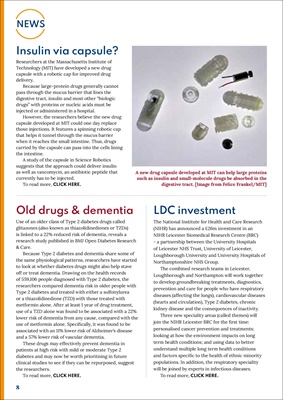
8
NEWS
Insulin via capsule?
Researchers at the Massachusetts Institute of
Technology (MIT) have developed a new drug
capsule with a robotic cap for improved drug
delivery.
Because large-protein drugs generally cannot
pass through the mucus barrier that lines the
digestive tract, insulin and most other "biologic
drugs" with proteins or nucleic acids must be
injected or administered in a hospital.
However, the researchers believe the new drug
capsule developed at MIT could one day replace
those injections. It features a spinning robotic cap
that helps it tunnel through the mucus barrier
when it reaches the small intestine. Thus, drugs
carried by the capsule can pass into the cells lining
the intestine.
A study of the capsule in Science Robotics
suggests that the approach could deliver insulin
as well as vancomycin, an antibiotic peptide that
currently has to be injected.
To read more, CLICK HERE.
A new drug capsule developed at MIT can help large proteins
such as insulin and small-molecule drugs be absorbed in the
digestive tract. [Image from Felice Frankel/MIT]
Old drugs & dementia
Use of an older class of Type 2 diabetes drugs called
glitazones (also known as thiazolidinediones or TZDs)
is linked to a 22% reduced risk of dementia, reveals a
research study published in BMJ Open Diabetes Research
& Care.
Because Type 2 diabetes and dementia share some of
the same physiological patterns, researchers have started
to look at whether diabetes drugs might also help stave
off or treat dementia. Drawing on the health records
of 559,106 people diagnosed with Type 2 diabetes, the
researchers compared dementia risk in older people with
Type 2 diabetes and treated with either a sulfonylurea
or a thiazolidinedione (TZD) with those treated with
metformin alone. After at least 1 year of drug treatment,
use of a TZD alone was found to be associated with a 22%
lower risk of dementia from any cause, compared with the
use of metformin alone. Specifically, it was found to be
associated with an 11% lower risk of Alzheimer's disease
and a 57% lower risk of vascular dementia.
These drugs may effectively prevent dementia in
patients at high risk with mild or moderate Type 2
diabetes and may now be worth prioritising in future
clinical studies to see if they can be repurposed, suggest
the researchers.
To read more, CLICK HERE.
LDC investment
The National Institute for Health and Care Research
(NIHR) has announced a £26m investment in an
NIHR Leicester Biomedical Research Centre (BRC)
- a partnership between the University Hospitals
of Leicester NHS Trust, University of Leicester,
Loughborough University and University Hospitals of
Northamptonshire NHS Group.
The combined research teams in Leicester,
Loughborough and Northampton will work together
to develop groundbreaking treatments, diagnostics,
prevention and care for people who have respiratory
diseases (affecting the lungs), cardiovascular diseases
(hearts and circulation), Type 2 diabetes, chronic
kidney disease and the consequences of inactivity.
Three new speciality areas (called themes) will
join the NIHR Leicester BRC for the first time:
personalised cancer prevention and treatments;
looking at how the environment impacts on long
term health conditions; and using data to better
understand multiple long term health conditions
and factors specific to the health of ethnic minority
populations. In addition, the respiratory speciality
will be joined by experts in infectious diseases.
To read more, CLICK HERE.